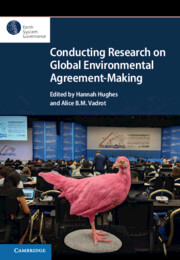Book contents
- Conducting Research on Global Environmental Agreement-Making
- Series page
- Conducting Research on Global Environmental Agreement-Making
- Copyright page
- Dedication
- Contents
- Figures, Tables and Boxes
- Contributors
- Preface
- Acknowledgements
- Abbreviations
- 1 Introduction
- Part I Developing a Methodology
- Part II Navigating Sites
- Part III Collecting and Analysing Data
- 8 Texts
- 9 Interviews
- 10 Ethnography
- 11 Collaboration
- 12 Networks
- Part IV Implementing and Adapting
- Index
- References
11 - Collaboration
Working Together Across Time and Space
from Part III - Collecting and Analysing Data
Published online by Cambridge University Press: 07 August 2023
- Conducting Research on Global Environmental Agreement-Making
- Series page
- Conducting Research on Global Environmental Agreement-Making
- Copyright page
- Dedication
- Contents
- Figures, Tables and Boxes
- Contributors
- Preface
- Acknowledgements
- Abbreviations
- 1 Introduction
- Part I Developing a Methodology
- Part II Navigating Sites
- Part III Collecting and Analysing Data
- 8 Texts
- 9 Interviews
- 10 Ethnography
- 11 Collaboration
- 12 Networks
- Part IV Implementing and Adapting
- Index
- References
Summary
As the configuration of global environmental governance has become more complex over the past fifty years, numerous scholars have underscored the importance of understanding the transnational networks of public, private, and nonprofit organizations that comprise it. Collaborative Event Ethnography (CEE) is a relational methodology that aims to capture the dynamics of these constantly shifting networks. CEE draws on multisited, team, and institutional ethnography to assemble teams of researchers to study major international conferences, which offer important political spaces where these networks can be observed. Drawing on more than ten years of experience with CEE, we argue that strong approaches to collaboration offer rich opportunities for analyses of global environmental governance. In CEE, researchers collaborate on all aspects of the research process, from research design to analysis to writing. The aim of this chapter is to introduce CEE, providing a history of its development, reviewing the benefits and challenges of CEE, reflecting on the theoretical insights generated through CEE in relation to understanding environmental agreement-making, and offering practical guidance for researchers interested in using the methodology. Going beyond CEE, the chapter also considers collaboration in the context of the broader scholarly landscape.
Keywords
- Type
- Chapter
- Information
- Conducting Research on Global Environmental Agreement-Making , pp. 210 - 227Publisher: Cambridge University PressPrint publication year: 2023
References
Further Reading
References
- 2
- Cited by



